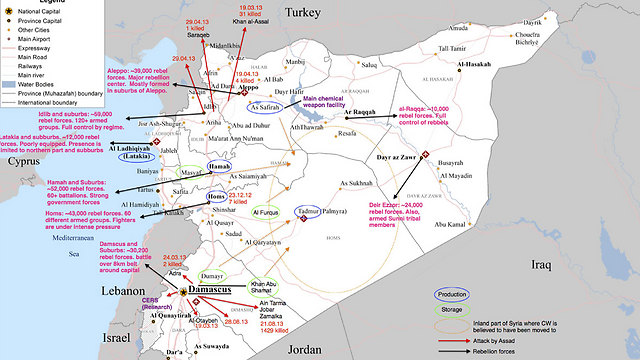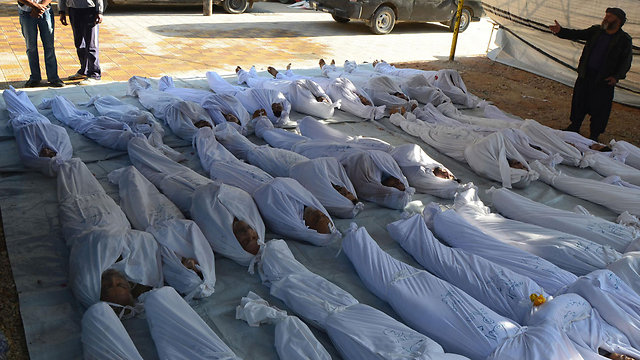
Israeli report maps Assad's chemical arsenal
Report by IDC counter-terrorist think-tank presents inventory of Syria's chemical munitions production, storage facilities, argues Syrian regime has been stockpiling since 1980s, arms could reach Hezbollah, Palestinians
New report reveals Syria is the owner of one of the world's largest chemical stockpiles.
The report, presented Monday by the Interdisciplinary Center Herzliya's International Institute for Counter-Terrorism, states that as of June 2013, Syrian President Bashar Assad holds one of the world's largest caches of mustard gas, sarin and the lethal nerve gas VX.
Related stories:
- Report: Syria amassed nerve gas as world watched
- Assad's arsenal: 100,000 missiles and rockets
- Kerry: US has evidence sarin gas was used in Syria
The institute's report described the manner in which Assad attained his impressive inventory as well as warning of the possibility the unconventional munitions could fall into the hands of terrorist groups active in Syria.

Click to view map of Syria's chemical weapons, attacks, caches
By the 1980s, the report stated, the Syrian regime had begun storing chemical stockpiles in 50 different towns throughout the country. In case the army is in need of the arsenal, aerial bombs, artillery shells and ballistic missiles and rockets have already been prepared in advance.
The sarin and VX gases, according to the report, is manufactured in five different locations throughout Syria: The main facility in Al-Safir, and the others in Homs, Latakia, Hama and Palmyra. The poisonous gas is transferred to storage facilities at Al Furqus, Dumayr, Khan Abu Shamat as well as in the Syrian Scientific Studies and Research Center in Damascus.
Different reports show that the Damascus center, which is under Assad's direct control, also houses biological weapons. The chemical arms are held by the Syrian regime or by militias loyal to it. In the areas neighboring major cities, in which the military situation is constantly changing as a result of battles between rebels and government forces, the West is uncertain who controls these storage facilities.
'Hezbollah could use arsenal'
Even before the chemical attack on a Damascus suburb three weeks ago took the lives of some 1,400 people, the report claims there was chemical weapons usage as part of the fighting Homs in December 2012. Between March and May of 2013 the report cites four different incidents of chemical attacks, which left some 150 people dead.

Victims of Syrian chemical attack (Photo: Reuters)
Even if an American attack on the stockpiles was to take place, and even if such an attack would topple Assad's regime, the report stresses that the threat that such weapons would reach the wrong hands still exists. "Hezbollah could use the arsenal under Syrian or Iranian instruction," the report's authors claim.
They further not that "under certain conditions, Assad could decide to provide the arms to Palestinian organizations with whom he is connected, specifically with the Popular Front for the Liberation of Palestine headed by Ahmed Jibril."
A scenario in which these arms reach rebel organizations, or worst, radical Islamist Jihadist organizations is Israel's worst nightmare, the report's authors claim.
Dr. Ely Karmon, a senior research at the institute, claims that the West came to grips with Assad's unconventional capabilities a little to late. "Already in the 80s, states like Russia, France, Switzerland and even the US were supplying ram materials and equipment which now serve as Syria's chemical infrastructure," Karmon claims.
"Only now, when Assad used the weapons, the world has awaken."
During his research, Karmon found two plausible explanations for Assad's choice to use chemical weapons. "There are claims that Syrian rebels, who were trained by the US, left Jordan for Syria and reached the outskirts of Damascus." Fearing their abilities, Karmon claims, it is possible that Assad decided to stop them at any price.
The second possible reason, according to Karmon, is that Assad had just survived an assassination attempt and had decided to exact revenge.
According to the senior researcher, it is the responsibility of Israel and the US to prevent these arms from reaching Hezbollah or rebels: "In such a case, the usage (of chemical weapons) would spiral out of control. No one could guarantee that there wouldn't be future usage."
- Receive Ynetnews updates directly to your desktop










